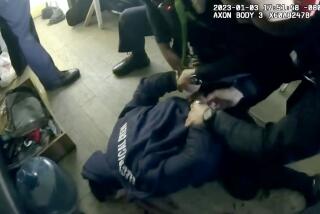Jury Calls for Life Term in Slaying of Officer, Passerby
- Share via
A Los Angeles Superior Court jury voted Wednesday in favor of life imprisonment for a 23-year-old Inglewood man convicted of murder in the shooting deaths of a Los Angeles police officer and an innocent passerby.
The jury, apparently convinced that reputed gang member Jaime Alex Mares played a secondary role in the deaths of Officer Brian Brown and 18-year-old Gerardo Sernas in the 1998 shootings, rejected the prosecution’s request for the death penalty.
“The very fact that he didn’t use the gun to kill Officer Brown and Mr. Sernas mitigated his participation in the crime,” jury foreman Renan Hidalgo said after the decision.
The same jury convicted Mares two weeks ago of the murders and six related counts stemming from a sequence of events that started with a retaliatory gang attack that mistakenly targeted Sernas. It ended with police shooting and severely wounding Mares after a foot chase at Los Angeles International Airport. Brown and the man who shot him and Sernas died in a gunfight with police.
Defense lawyers said they will appeal the guilty verdicts. But both sides in the trial, including families of the victims and the defendant, said they were satisfied with the jury’s decision against the death penalty.
“In a certain way, spending the rest of your life in a prison is a form of being dead,” said Ernesto Sernas, the 30-year-old brother of Gerardo.
Dennis Brown, the father of Brian, said he was satisfied with the sentence, but added that it doesn’t ease the pain of his loss.
“When you have a loved one who has died, you never have a sense of closure,” he said. “All of us are victims, the Sernas, our family and the defendant’s family.”
“I just don’t think [Mares] loved his family,” Brown said. “Because if he had he would not have chosen the gang life over his family.”
Mares’ parents and other family members declined to comment. But defense lawyers Marcia Morrissey and Victor Sherman said they were relieved that the jury did not vote for the death penalty.
“We are pleased that the jury bought our version that Alex, by nature, is not a violent person,” Sherman said, referring to the comments of one juror after Wednesday’s decision to sentence Mares to life in prison without the possibility of parole.
Sherman and Morrissey have argued that Mares was an unwilling participant in the drive-by shooting of Sernas and in the subsequent attempt to escape.
Mares testified that Oscar Zatarain, 23, a member of the Inglewood-13 street gang, and an unidentified person tricked him into going on the shooting rampage that was meant as retaliation for an attack the night before that had targeted Mares and wounded one of his friends.
Mares said Zatarain had said nothing about shooting anyone and told him they were just going to take some guns to a friend’s house.
Mares said that after the shooting, Zatarain forced him at gunpoint to flee from police. He said he continued trying to escape instead of giving himself up after Zatarain was killed because he was afraid police would shoot him.
Deputy Dist. Attys. Danette Meyers and Keri Modder contended that Mares planned the drive-by with Zatarain. They said Mares obtained the car they used in the attack, participated in the shooting and was the driver when he and Zatarain fled.
They acknowledged that Zatarain did the killing, but they argued that Mares should have been put to death because his role was no less serious than that of the gunman.
Although Mares’ lawyers say they are pleased that the jury rejected that recommendation, they still plan to appeal the jury’s guilty verdict.
Morrissey and Sherman say Judge William R. Pounders erred by refusing to let the jury consider a less serious charge of second-degree murder, which occurs when someone maliciously kills another but without premeditation. It carries a punishment of 25 years to life with the chance of parole.
Prosecutors said the judge’s decision was correct because the evidence showed the killing was planned and premeditated, which are the key factors in a first-degree murder.
Hidalgo, the jury foreman, said the jury probably would have convicted him of second-degree murder if the judge had allowed that alternative, primarily because Mares did not do the shooting.
Nevertheless, he and two other jurors said the jury clearly believed Mares willingly participated in the incident.
“He had been shot at the night before, so he had the motive,” said one juror, who asked not to be identified.
Hidalgo added: “He was the driver.”
They said they took one vote for the verdict, and it was unanimous.
The death penalty decision also came with one vote, but three or four initially argued in favor of death, Hidalgo said.
Ultimately, strong appeals to the jury from his mother, cousin and friends played a major role in their decision to spare his life. From them they became convinced that he did not have a violent nature, but that he was easily led into violence by others.
Another juror said he thinks the jury simply deferred to what he thought was God’s plan.
“He was shot several times,” the juror said. “If he was supposed to die, the good Lord would have taken him then.”
*
Times staff writer Twila Decker contributed to this story.
More to Read
Sign up for Essential California
The most important California stories and recommendations in your inbox every morning.
You may occasionally receive promotional content from the Los Angeles Times.













